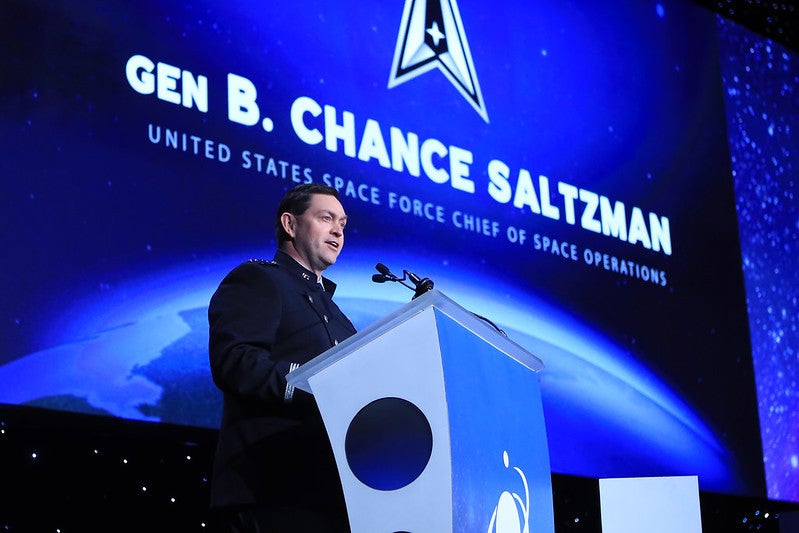Space Force Chief Warns Against Complacency in Space Operations

Gen. B. Chance Saltzman is the Chief of Space Operations, United States Space Force speaks on April 19 at Space Symposium. Photo: Space Foundation
The head of the U.S. Space Force wants to shake up how the U.S. military works in space, challenging the “comfort” that comes out of continuity, success, and the “family-like” atmosphere in the space industry.
Speaking at Space Symposium in Colorado Springs on Wednesday, Space Force Gen. Chance Saltzman, chief of space operations, outlined multiple ways the Space Force is working at this, particularly in terms of how that relates to the commercial industry.
“I’m worried about a … subtle form of complacency,” Saltzman said. “One that grows out of the comfort of continuity, the comfort of our expertise, the comfort of our successes. What we have done and how we have done it has worked and worked well. But I fear we think it will work well forever. This form of complacency might allow us to think that our tried and true methods and mindsets will be sufficient to address new challenges.”
For the first time in almost two generations, the U.S. and allied forces must contend with space-enabled attack, he said, speaking to the threats of the present environment, like the combination of space-based ISR and precision-guided munitions, anti-satellite weapons, grappling satellites, cyber attacks, and increased debris in space.
All of this requires the Space Force and space industry to “aggressively dismantle old processes and procedures” to be successful, Saltzman said.
The Space Force is actively seeking opportunities for partners to align with the military early in design work, and in its concepts and wargames, he said, citing the recent Schriever Wargame on space and cyberspace issues that included 14 companies and seven international partners.
In addition, at Vandenberg and Schriever Space Force Bases, there are cells within the operations centers focused on integrating commercial and international partner capabilities into daily operations. “Within these cells we plan out collaborative maneuvers, or discuss how to best respond to aggressive activity within the domain,” Saltzman said.
This comes with added expectations on commercial players because of the nature of risk associated with military missions for assuredness, Saltzman said during a media briefing following his remarks.
“It’s nothing that industry isn’t aware of, it’s nothing the industry probably can’t handle,” Saltzman said. “Those extra requirements that we layer on require new analysis, new engineering — a few more requirements that start to stretch out the procurement of those capabilities. It’s just part of doing business with a military organization, rather than just commercial.”
One area where old ways of doing things need to shift is decision-support software, regarding the tools an operator has to rapidly make sense of all the data available from the space domain. Current tools are limited, he said.
“How do we compile the data we need and present it to an operator in a way that they can make rapid decisions in seconds and minutes, as opposed to thinking in terms of hours and days?” Saltzman asked. “That I think is ripe for exploration. It causes us to rethink — Who makes the decision, and at what level? What systems do they have? How’s the data move? How do we protect that data as it’s moving through the systems? We’ve got to think differently about how to pull all that together.”